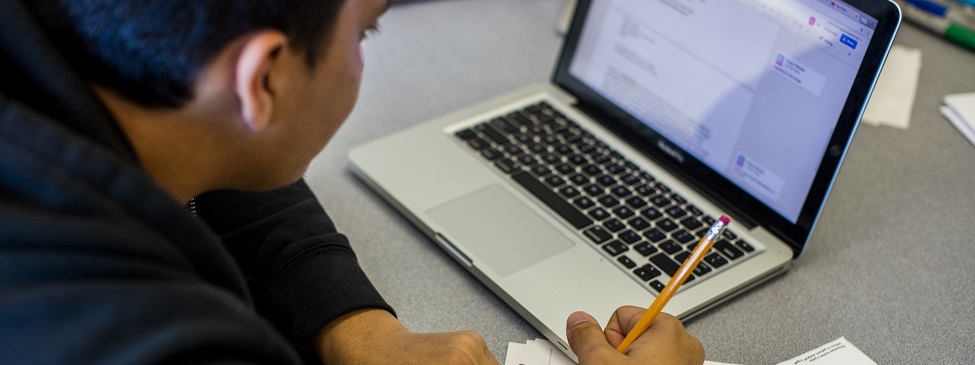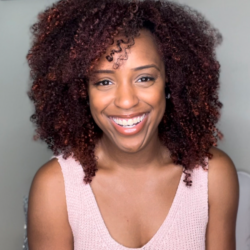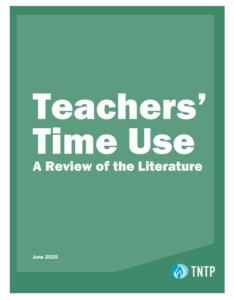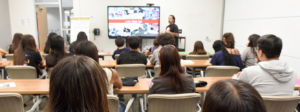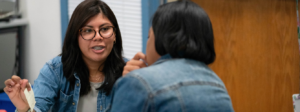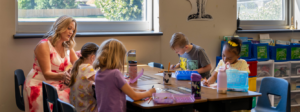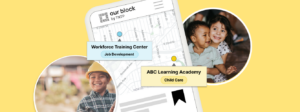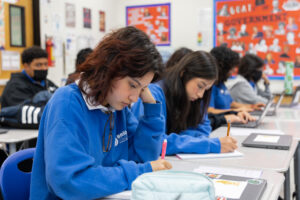During a “normal” year, students eat together, play games together, laugh together, cry together, and grow together. But this year, the unprecedented disruption of the COVID-19 pandemic has meant students have fewer opportunities to interact meaningfully and authentically with each other—often having their togetherness reduced to a Zoom room.
It’s been hard for kids to feel like they belong to a community of loving and caring people. But in Edgewood ISD, near San Antonio, Texas, high schoolers Jennica Avila, Michael Valdez, and KC Cerda are navigating the pandemic the best way they know how: together. They talked with me about their experiences this school year—online, in-person, and hybrid—and the new opportunities they’ve had to share those experiences with their school and district leaders.
If you could pick one song to describe your life this year, what would it be and why?
KC: Well, for me, the song to describe my year is probably “It’s All Coming Back to Me Now” by Celine Dion, only because I feel like during this quarantine I’ve been going through a lot of memories of what it used to be before quarantine and before we had to be to ourselves. We would go out all the time. We would eat out. It was a good thing that last year we went to Disneyland because this year we wouldn’t have that opportunity. Yeah. I’m just going through memory lane during this quarantine.
Jennica: I’ve been listening to Tori Kelly a lot. She had an album that came out a long time ago, pretty old, and it’s called “Confetti,” the song. I feel like I would relate to that now because it’s about her dreaming really big and then having to keep herself in line like, “Okay, this is what you have to do to achieve those steps.” I feel like that’s where I’m at right now, just taking steps one at a time to achieve my dreams slowly but surely.
Michael: I listen to a lot of musical theater and I’m a really big fan of Andrew Lloyd Weber. The song that I really feel like is mine is “Everything’s Alright,” from “Jesus Christ Superstar.” I’m going to pick that one just because this year’s all right. It’s not the greatest, it’s not the best, but it’s all right.
Think back to BC—before Corona. What was life like? What was your experience in school like?
Michael: The three of us were in the same drama program and going to do our production. It was a black box show, where the audience is right in front of you. It was going to be “Macbeth.” We had a lot of face-to-face interactions with everyone else like teachers and students.
Jennica: We’re all from the same program, the same school. We were in everything together. There was never a day where any of us were apart really. We’re just so closely connected that we do everything together, we participate in everything together, and we produce everything together.
We were going from seeing each other every single day to now just maybe a phone call or a video FaceTime like this maybe once, twice a week. It definitely changed a lot of us. I think it’s helping us appreciate each other more. I feel like now that we took the hit, we’re like, “Okay, we should have been so grateful.”
KC: We’re basically coworkers. We never really are apart unless we’re in different classes, but after school we all are together. I had no idea Corona was going to be such a big thing. I thought we would be in quarantine for two weeks and then we’re back to school. But then, two weeks became eight months, and longer. It was just all very, very surreal, if that’s the right word. The odd thing is we got quarantined during a break and we’re like, “I do not want to go back to school. I want another week off.” Now all I want now is I want to go back to school. I want as much time in school as I possibly can because it’s been very rough doing online learning and all that.
How would you say you’ve been handling this change? How are you guys taking care of yourselves?
Michael: For me, the change was pretty hard. But now, it’s good because it’s allowing me to participate in my community and local government.
KC: In a way, it was a growing moment for me. I took quarantine not as something to be sad about, but as a learning experience. I really got to express more about myself during quarantine. I’m glad quarantine happened. Not because I’m separated from my friends, but because I’ve grown a lot.
What has your experience been like going through virtual school? Has it been a little rough or easy to adjust to?
Michael: For me it’s hard because some days I want to log into my classes but some days I just don’t want to do it. Some days I won’t attend class, I’ll just watch the recording which is also allowed.
KC: I’m the type of student that wants a teacher in front of me because I get distracted easily. I need someone who can come towards me and tell me how to do it right in front of my face. I couldn’t quite do that online and because I am dyslexic, it was hard. I’m so adjusted to a learning environment at the school. I can’t quite turn that into a learning environment at my house. Now that I’m fully back in the classroom, if I had to go back to online learning, it would be very difficult.
Jennica: I’m doing hybrid learning and honestly, I feel like I’m a little biased on this one because unlike KC and Michael, I am enjoying online learning. I’m thriving a lot better. I was very distracted in school. I felt like I didn’t have my priorities set on school. Now being virtual, I feel like it’s really on me at this point. I feel like I’m personally doing better. But for both online and in person, with in person, we only have one teacher a day. I would like to start moving classes and seeing other teachers.
Do you find that you are being more challenged, less challenged, or roughly the same in your courses now prior to the pandemic?
Jennica: I would say more. Sometimes I feel like the teachers are overwhelming a little bit, more so with the amount of text messages we receive. It’s just something about always seeing the notifications going. It’s like, “Okay, I have an assignment. I get it.” And then, “Make sure you do it. You got to do it. Remember it’s due.” That’s something that’s—it makes it a little bit harder to want to do it. I feel like we’re often held so accountable that we kind of expect someone to tell us to do it. So when certain classes that used to always remind me about my work don’t send out messages, it’s on me at that point. That’s when I feel like it’s a little bit more difficult than someone constantly reminding me in person.
Michael: I would say the opposite. I would say I feel less challenged just because of how our schedules are, our one hour classes and then you have about one to two more days to actually submit your assignment. Attendance can very easily be taken by a simple turn in or a question.
KC: I would very much say it’s more challenging because everything is virtual and everything is just so much harder to do when it’s not in person. Back to a long time ago when Jennica said we want to be rotating classes, I would very much like to go back to rotating classes because that would be a lot much easier for me. Yeah. I feel I it’s been a lot more challenging than less challenging.
You all have been receiving regular surveys asking you about your experience in school each week. What does it feel like to be asked those questions?
KC: When I take those surveys for my school, I feel like I’m doing my part, saying what I want, and how I want to be taught and how I would like to be taught. Sometimes for the majority for my classes, it is heard but some of them, it’s been the same since day one. I’m a tad bit bummed out by that, but I’ve adjusted to that. I’m doing them with the mindset of thinking, “Yes, these teachers are very much trying. It’s very hard for teachers as well. I’m not shading any teachers right now, but I do have notes on how they teach and how they present to us the assignment and the topic.”
Jennica: Honestly, I feel like it’s not doing as much as I would like it to do. When I do the surveys, I expect them to see that and change just a little bit. I’m not expecting them to read my entire list, but take into account if this is what I feel and this is what I want, I feel like other students would probably think that, too.
So if you could tell your teachers one thing, if you could give them one piece of feedback specifically surrounding the surveys, what would you want them to know?
Jennica: If we do a survey, I would like to be known that I’m heard. Whether it’s a “I received your thing, this is really a good thing, I will take it into account next time” or even just a follow-up question, I would feel like they listened to me and they heard me out and they want to know more about why I think that or how I think it’d be better for everyone.
KC: If I want to do a survey and if I could tell them one thing, I would tell them they’re doing a great job because I know how hard it is for teachers to adjust to this. I know how having almost 150 students and getting asked these questions about grades, I know it might be very difficult. But at the same time, I just, like Jennica said, I would like to be heard. I would like to make my survey acknowledged, even if it’s just a bot sending me an email saying, “We got your email. We appreciate your feedback. This will be noted.” That itself would be a good thing for me just so I know it’s received and all that.
I’ve heard that you guys have been leading some drama learning in district middle schools. What is that?
Jennica: For us right here in our program, I’m the vice president, Michael is the stage manager and student director and KC’s the public relations officer. What we’ve been doing is mentoring them and helping them better understand and appreciate the love for theater.
Michael: For me, I’m more the guy of like, “Hey, meeting’s tomorrow. Be sure to be on time.” I’m not really into acting, per se, but I think this is very heartwarming to me because it’s an experience that we didn’t have as middle schoolers.
KC: I just love to mentor them and tell them how they can do things differently. I feel like it’s been very much a learning experience for them.
